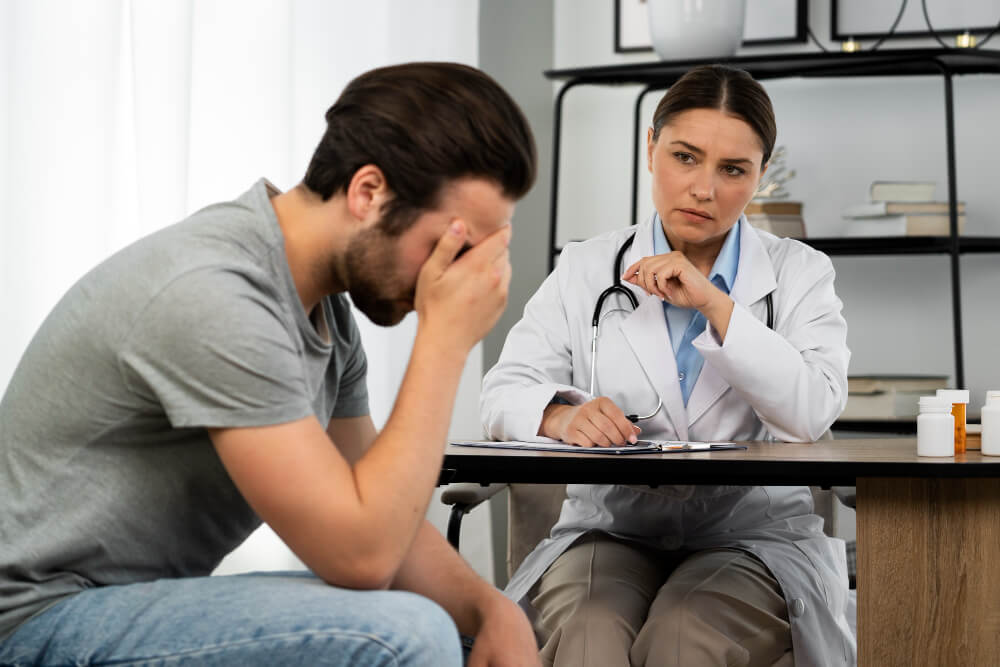Gonorrhea, often referred to as “the clap,” is a common sexually transmitted disease (STD) caused by the bacterium Neisseria gonorrhoeae. While not always accompanied by noticeable symptoms, Gonorrhea can lead to serious health complications if left untreated. This article empowers you with knowledge about Gonorrhea, its signs and symptoms, and the importance of getting tested for peace of mind.

Understanding Gonorrhea: A Bacterial STD with Unpleasant Symptoms
Gonorrhea is transmitted through vaginal, anal, or oral sex with an infected person. It can infect both men and women and is particularly prevalent among young adults. The CDC estimates nearly 673,000 new cases of Gonorrhea occur in the United States annually, highlighting its widespread nature.
Symptoms of Gonorrhea:
Gonorrhea often presents with no symptoms, especially in women. However, some individuals might experience signs and symptoms that vary between genders:
Symptoms in Women:
- Burning sensation during urination
- Increased vaginal discharge (may be yellow, green, or bloody)
- Pelvic pain
- Painful sexual intercourse
- Abnormal uterine bleeding
Symptoms in Men:
- Burning sensation during urination
- Discharge of pus from the penis (may be white, yellow, or green)
- Painful or swollen testicles
- Burning or itching sensation around the opening of the penis
What Makes Gonorrhea a Threat?
While symptoms can be unpleasant, the real danger of Gonorrhea lies in its potential complications if left untreated. These include:
- Pelvic Inflammatory Disease (PID) in Women: PID can cause chronic pelvic pain, infertility, and ectopic pregnancy.
- Increased Risk of HIV: Gonorrhea can make individuals more susceptible to contracting HIV.
- Spread to Other Body Parts: Untreated Gonorrhea can spread to the eyes, throat, or joints, leading to serious infections.
Recognizing the Signs and Symptoms: Could You Have Gonorrhea?
The absence of symptoms doesn’t guarantee the absence of Gonorrhea. Here’s why getting tested is crucial:
- Early Detection and Treatment: Early diagnosis allows for prompt antibiotic treatment, preventing potential complications.
- Protecting Your Partner: Gonorrhea is highly contagious. Getting tested and treated can prevent unknowingly transmitting the infection to your partner.
- Peace of Mind: Knowing your Gonorrhea status reduces anxiety and allows for informed decisions regarding your sexual health.
Who Should Get Tested for Gonorrhea?
The CDC recommends routine Gonorrhea testing for all sexually active individuals under 25, especially those with new or multiple sexual partners, a history of STDs, or unprotected sex.
Getting Tested for Gonorrhea: A Confidential and Efficient Process

Gonorrhea testing is a simple and confidential process available at various healthcare settings, including:
- Doctor’s offices
- Planned Parenthood clinics
- Community health centers
- Sexual health clinics
Two common types of tests are used to detect Gonorrhea:
- Urine test: This is a non-invasive test involving collecting a urine sample.
- Swab test: A swab is used to collect a sample of cells from the cervix in women or the urethra in men.
Both tests are quick and painless, and the results are usually available within a few days.
Taking Charge of Your Health: Get Tested, Get Treated
If your Gonorrhea test comes back positive, don’t panic. Gonorrhea is a curable infection with readily available antibiotics. It’s essential to complete the entire course of medication as prescribed by your doctor to ensure complete eradication of the bacteria.
Here are some additional steps to take after a positive Gonorrhea diagnosis:
- Inform your sexual partners: Let them know they need to be tested and treated to prevent further spread of the infection.
- Abstain from sexual activity: Avoid sexual contact until you and your partner(s) have completed treatment to prevent transmission.
- Retesting: Get retested after completing treatment to ensure the infection is completely cleared.
By prioritizing regular testing and taking proactive steps if diagnosed, you can effectively manage Gonorrhea and maintain good sexual health.
Beyond Gonorrhea: Importance of Comprehensive STD Testing
While Gonorrhea is a major focus, it’s important to consider getting tested for other STDs as well. Many other STDs, such as Chlamydia, Syphilis, and HIV, can also present with minimal or no symptoms. Routine testing for a comprehensive panel of STDs ensures overall sexual wellness and early detection of any potential infections.
Remember, taking control of your sexual health starts with awareness. By understanding the risks associated with Gonorrhea and the importance of testing, you can make informed decisions to protect yourself and your partner.
